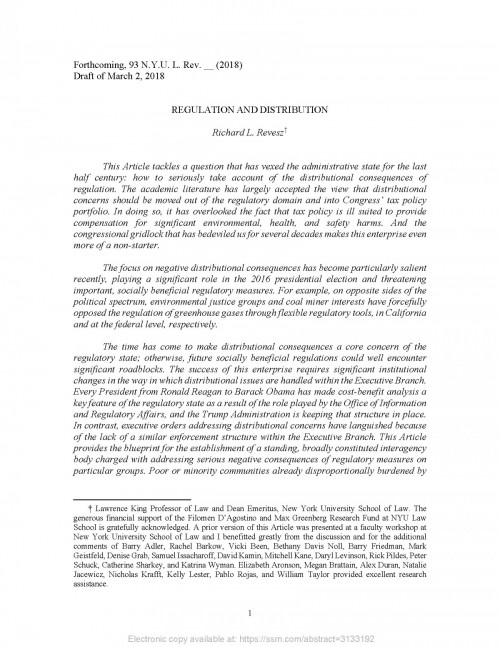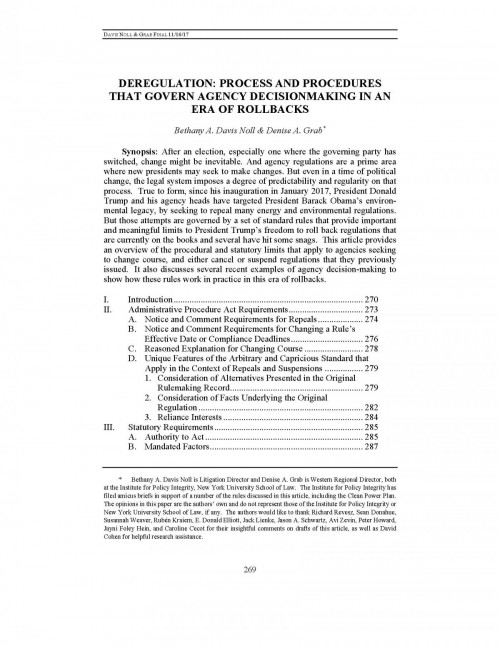-

Regulation and Distribution
Most regulations seek to improve social welfare, but maximizing overall welfare may not help or protect all groups evenly. Many economists suggest handling unequal regulatory effects through the tax system. But some harms—like the disproportionately high environmental pollution felt by poor and minority communities and loss of the employment base in rural communities due to shifts in the economy—cannot be addressed by monetary compensation alone. A new article by Richard Revesz, published in the NYU Law Review, offers a blueprint for establishing a standing, broadly constituted interagency body charged with addressing serious negative consequences of regulatory measures on particular groups.
-
Comments to Interior on Offshore Drilling Safety Requirements
The Bureau of Safety and Environmental Enforcement (BSEE) within the Department of the Interior is tasked with setting safety and environmental standards for offshore oil and gas production and exploration in federal waters. While BSEE updated its safety requirements in 2016, it now proposes to weaken and repeal some of these safety requirements in order to encourage more oil and gas production. In our comments on the proposed rule, we argue that the agency has failed to provide a reasoned explanation for repealing these requirements, which were part of a comprehensive update to safety regulations that had not been revised since 1988.
-
Comments to EPA on Grandfathering and Glider Trucks
The Environmental Protection Agency (EPA) has proposed to grandfather glider trucks, which have new truck bodies but old powertrains, into older emissions requirements. Our comments to EPA argue that the Agency improperly disregarded the effects that this exemption would have on air pollution, public health, and environmental quality, in violation of both the Clean Air Act and applicable executive orders on cost-benefit analysis. In particular, EPA failed to consider the extent to which its action will increase air pollution (and attendant environmental harms) by extending the useful economic life of older, dirtier powertrains.
-
Briefs and Comments on Department of Education’s Borrower Defense Rule
Under Secretary Betsy DeVos, the Department of Education has twice delayed implementation of the Borrower Defense Rule, a 2016 regulation designed to help students who have been defrauded by for-profit educational institutions discharge their federal student loans. In our amicus brief supporting borrower and state challenges to the delay, we argue that the Department violated the Administrative Procedure Act by arbitrarily disregarding the harms that the delays impose on student borrowers. We also submitted a comment letter to the agency regarding the second delay.
-
Public Comments on Regulatory Review (SBA, NCUA, FDA, DOT and USCBP)
Federal agencies continue to request the public’s suggestions for rules to repeal or reform, tacitly implying that most regulations stifle economic growth. In comments to several agencies, we argue that regulatory review should consider the public benefits of regulation, not just the costs to regulated industries, and should prioritize review of rules for which actual costs and benefits diverge significantly from predicted costs and benefits. We also recommend that agencies develop prospective plans for regulatory review going forward. The agencies for which we recently filed comments include Small Business Administration, Department of Transportation, National Credit Union Administration, Food and Drug Administration, and Customs and Border Control Bureau.
-
ACUS Adopts Recommendations on Marketable Permits
The Administrative Conference of the United States (ACUS), an independent federal agency that recommends improvements to government processes and procedures, recently approved a set of recommendations from Policy Integrity’s Jason Schwartz concerning marketable permits. Marketable permits, in the appropriate context, are a powerful tool for achieving policy objectives more efficiently, by letting market participants buy and sell compliance obligations. But like all markets, permit markets require proper oversight to prevent market manipulation. The new recommendations adopted by ACUS provide agencies with best practices on structuring and overseeing marketable permit programs.
-

Deregulation: Process and Procedures That Govern Agency Decisionmaking in an Era of Rollbacks
Though change might be inevitable when a new governing party comes to power, the United States’ legal system imposes a degree of predictability and regularity on that change. Since his inauguration in January 2017, President Donald Trump and his agency heads have been working to repeal many energy and environmental regulations issued under prior administrations. But these attempts are governed by a set of standard rules that limit President Trump’s freedom to roll back regulations. This article, published in the Energy Law Journal, provides an overview of the procedural and statutory limits that apply to agencies seeking to change course and cancel or suspend regulations that they previously issued. It also discusses recent examples of agency decision-making to show how these limits work in practice.
-
Reply Comments to FERC on Grid Reliability and Resilience Pricing
In September, Energy Secretary Perry asked the Federal Energy Regulatory Commission (FERC) to adopt a new rule that would guarantee plants with 90-day on-site fuel, mostly coal and nuclear plants, full cost recovery. We submitted an initial set of comments in response to their Notice Inviting Comments, and we have now submitted reply comments.
-
Brief on EPA Chemical Disaster Rule Delay
EPA recently delayed the effective date of a rule that would have decreased the severity and number of chemical accidents at manufacturing facilities and refineries. State and NGO plaintiffs sued EPA over the delay, arguing that EPA did not have statutory authority to issue it, and that the delay was arbitrary and capricious. We filed a brief in support of petitioners arguing that EPA did not offer an adequate explanation for choosing to forgo the benefits of the chemical disaster rule.
-
Providing Information for DOE’s Net Metering Study
Net metering, the predominant approach to compensating distributed solar generation in the U.S., essentially pays households with solar panels a flat retail rate for every kilowatt hour they send back to the grid. In response to the Department of Energy’s request for information on the costs and benefits of net energy metering, we submitted Richard Revesz and Burcin Unel’s law review article on net metering and distributed electricity generation. The paper analyzes the benefits and costs of distributed generation, and identifies ways for state policy to better match consumer compensation for solar generation with the energy system and environmental benefits that it provides. It also includes information that is relevant to the RFI including the identification and categorization of the costs and benefits of net energy metering policies.
Viewing recent projects in Government Transparency


